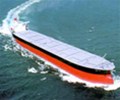Compulsory COVID-19 quarantine measures slammed as shipping industry fears exodus of skilled workers

Queensland residents who crew Australian-flagged ships will be forced into quarantine upon returning home, if their ships dock in states deemed COVID-19 hotspots, under a new directive.
The latest maritime protocol from Queensland Health emphasises that maritime crew returning from working interstate are not considered specialist workers performing an essential activity.
The rule change has been slammed by industry group Maritime Industry Australia Limited (MIAL), which claims the rule change lacks a rationale, given the tight measures employed by ships to prevent onboard transmission.
CEO Teresa Lloyd said the move risked the welfare of ship crews who often work for more than six weeks, without stepping off ships or interacting with land-based staff in New South Wales and Victorian ports.
“Queensland is actually one of the largest suppliers of seafarers to the whole nation, it’s in excess of 60, but in the small workforce like the maritime industry that’s a significant number,” she said.
“The question we have is ‘why now?’; why would they do this when Victoria has turned a corner and numbers are so low?
“We haven’t had any issues to date, through the worst of the second wave in Victoria — why would we do this now to a group of essential workers?”
MIAL stressed that crews on vessels supplying Bass Strait’s oil and gas fields, coastal New South Wales and the Victoria-Tasmania shipping route would be especially affected by the changes.
“The maintenance of critical supply chain and the normal function of maritime activities to support the resources sector is an issue for all Australians,” Ms Lloyd said.
“These people have been on a vessel or six weeks or more — they are not circulating within COVID hotspots: the fact their vessels hit the wharf in Victoria, does not mean they’ve been in a COVID hotspot.”
A spokeswoman for Queensland Health said updates to the protocol bring it in line with updates to the border restrictions direction.
Shrinking workforce feared
Ms Lloyd said while the financial impact of wearing the cost of hotel quarantine would fall on business, seafarers would find the family separation tough.
“The ships won’t stop, unfortunately that’s when people would start to care — it’s the seafarers, it’s the impact on them and their colleagues that is the impact here,” she said.
With an already shrinking domestic shipping sector, the industry fears potential staff losses could be felt for years to come.
To become a pilot in an Australian port, staff must first train as master mariners, a qualification that can take more than 10 years to attain.
A recent Senate Standing Committee on Rural and Regional Affairs and Transport inquiry into Australian shipping heard the nation was highly dependent on foreign ships for domestic freight.
The Maritime Union of Australia submission detailed the impact of the COVID-19 pandemic, highlighting what it said was a need to strengthen the resilience of maritime supply chains and increase self-sufficiency.
“Australia was caught unprepared for the COVID-19 pandemic, with this global crisis highlighting the urgent need to reduce Australia’s dependency of foreign shipping in both domestic and international trade,” secretary of the MUA, Paddy Crumlin said.
Essential workers
MIAL is campaigning for seafarers to be treated as essential workers, in line with others in the transport sector.
Its submission to the Senate shipping inquiry cited the Seafaring Skills Census as evidence the sector will face a shortage of more than 560 seafarers by 2023.
The census found 80 per cent of employers require advanced skills and experience on ships, particularly for shore-based roles, with a global shortage looming this decade.
“Anyone who’s considering their future beyond COVID, might look back and think ‘well that’s how I’m treated and I’m an essential worker, maybe I’ll find something else to do’,” Ms Lloyd said.
“We already have a looming shortage on our hands of skilled mariners in this country — we’re very concerned this is going to turn people off continuing their careers.
“There’s plenty of alternatives, allow these people to isolate at home, we’re a disciplined industry, the industry has very strict COVID management plans for their vessels.”
Source: ABC Rural

 Hellenic Shipping News Worldwide Hellenic Shipping News Worldwide, Online Daily Newspaper on Hellenic and International Shipping
Hellenic Shipping News Worldwide Hellenic Shipping News Worldwide, Online Daily Newspaper on Hellenic and International Shipping





















 PG-Software
PG-Software